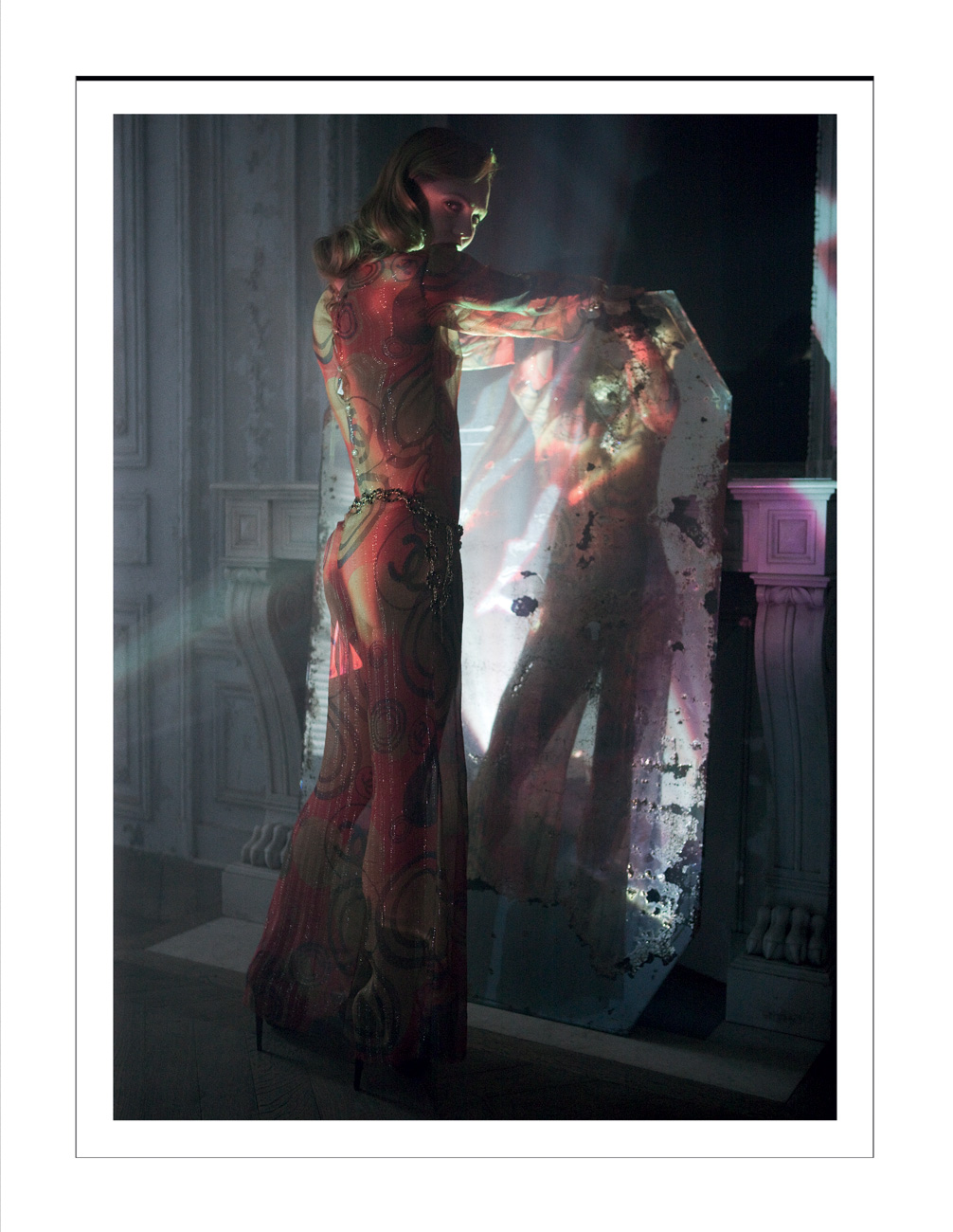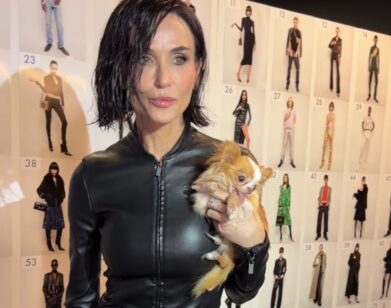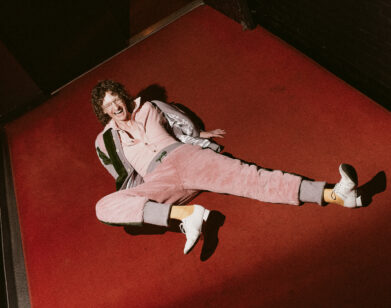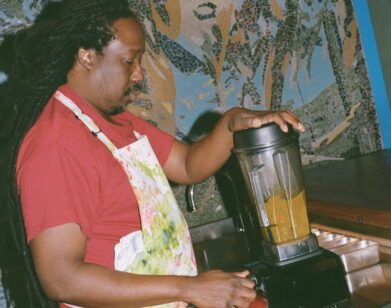Vanessa Paradis
it was never like somebody pushed me to sing, because i wanted to do it.Vanessa Paradis
Few people boast the kind of multi-hyphenate status of Vanessa Paradis, but as anyone who knows Paradis would quickly argue, it would be very unlike her to boast about anything. The 37-year-old singer, actress, model, mother of two, longtime partner of Johnny Depp, and famous self-effacing performer became an international pop star at the age of 14 when her single, “Joe le Taxi,” off her debut album, M & J (1987), shot to the top of the charts in her native France. But Paradis’s aspirations have always been more creative than commercial. Her second record, Variations sur le Même T’Aime (1990), was a collaboration with Serge Gainsbourg, and that same year, she won the César Award For Most Promising Actress for her performance in Jean-Claude Brisseau’s film Noce Blanche (White Wedding, 1989), and began a nearly two-decade relationship with Chanel when she appeared in the campaign for the fragrance Coco. (Paradis can currently be seen in Chanel’s Rouge Coco lipstick and Coco Cocoon handbag campaigns). Her first English-language album, the self-titled Vanessa Paradis (1992), was co-written and produced by Lenny Kravitz. But for the rest of the 1990s, Paradis turned the bulk of her attention to acting and concluded the decade with perhaps her most acclaimed turn in Patrice Leconte’s 1999 film La fille sur le pont (Girl on the Bridge). It was also around this time that she met Depp; the couple now has two children, 11-year-old Lily-Rose and 8-year-old Jack, and they split their time between homes in Los Angeles and the South of France.
Paradis still records and tours-she will release a live record, Vanessa Paradis: Concert acoustique à l’Opera Royal de Versailles, this month-and recently appeared in the romantic comedy L’amacoeur (Heartbreaker), co-starring Romain Duris, which came out in the United States in September. She has also lent her voice to the 3-D animated film A Monster in Paris, due out next month, and is currently shooting a new drama called Café de flore, directed by Jean-Marc Valleé, who also directed The Young Victoria. Here, she speaks with her friend Patti Smith, with whom she recently reconnected when they both performed, separately, during Peace Day festivities on September 17 in Paris.
PATTI SMITH: So, in preparation for this interview, I sat and contemplated. It’s been raining, so I got up very early, just thinking of you, and how you look, and the way that you are. I really thought that despite all of your responsibilities in your work, in your life, as a mother, you have retained your sense of wonder, which I think is a very beautiful, childlike trait. And that made me wonder what you were like as a child. So my first question is: What were you like when you were younger?
VANESSA PARADIS: I was an only child until I was 11 years old, which is when my sister was born. So for 11 years, it was just me. And I guess I was quiet. I’d spend a lot of time with my parents. They’d take me everywhere-to their friends’ dinners, poker games, everywhere . . . I was just there. If I was not with them, I was with my maternal grandmother, and we would do a lot of gardening together. And when I wasn’t doing that, I was playing by myself quite a bunch, which was fine. I loved it. I loved to put on disguises or just put on a tablecloth or whatever I’d find.
SMITH: You liked to play dress-up?
PARADIS: I liked to play dress-up. I also would draw a lot. I was doing some dance classes, too, which I loved very much. I was born in a suburb of Paris, and I grew up there until I was 16, so there were always a lot of barbecues, a garden, friends. Of course, I had a lot of friends-when I say I was quiet, I wasn’t that quiet, but more on the quiet side.
SMITH: As an only child, you must have had a certain amount of solitude-more solitude than other children.
PARADIS: Yes, and it was great. I guess when you don’t know any different . . . I guess it made me go into my own world a lot. But I was surrounded by love and beautiful people.
SMITH: You were a happy child.
PARADIS: A happy child . . . I’m not saying I was a good girl-I’m just saying I wasn’t trouble at all.
SMITH: Well, I was a good girl.
PARADIS: [laughs] I can believe that.
SMITH: Do you remember when you started singing?
PARADIS: I think I always did. The thing that really comes to my mind first is the American musicals, the MGM musicals. There was this show called That’s Entertainment where they compiled a bunch of MGM’s musical films. You’d have Gene Kelly or Fred Astaire or people introduce it, and they’d talk about the MGM years and show clips of all those movies. So it was the colors and the music and the big orchestra arrangements and the dance numbers and all that . . .
SMITH: Things like Singin’ In the Rain [1952] with Donald O’Connor and Gene Kelly.
PARADIS: Singin’ in the Rain was the one for me. Yeah. I mean, Gene Kelly could just sway and never fall. He’d just sway and sway as he danced. It’s funny, though, because I loved so much the big spectacle with the orchestra and all the strings and horns. I could sing in English before I could understand it because I phonetically learned it from the musicals. I messed up the words, but I could sing everything. But then, also, my dad used to play songs for me. He could play a few things, and he taught me some to sing-not to play. So he’d play and I’d sing. I just loved it.
SMITH: Because you recorded at such a young age you must have discovered your voice very early?
PARADIS: It’s almost like I didn’t have time to think about it. It was never like somebody pushed me to sing, because I wanted to do it. But I wanted to do it more like how you’d be at home with your friends and put on a show together. My friends and I would choreograph and we’d sing a song. I was singing constantly, and I’d heard people say, “Oh, my gosh. She can sing in pitch.” So that’s a good thing to have, you know.
SMITH: Yes, it’s a magical thing to have.
PARADIS: But that said, I don’t think I was that good. When I started to record, I could sing in pitch, but that was maybe about it. What happened is that my uncle [Didier Pain], who is not in the music business at all-he is an actor, but some of his friends were in music-would take me to visit a movie set or to a theater. One day he took me to a recording studio because his friends were recording there. It was actually a young actress who I loved very much who was recording her album there. He was like, “Would you like to come see a recording studio? Maybe you’ll get to meet this person.” I was like, “Yeah! Cool. Sure.” I was 12. This is where I met the composer and the author [Franck Langolff and Étienne Roda-Gil] of that first song that was a big hit for me-that “Joe le taxi” song. The composer was doing his own album a little later and maybe because of his friendship with my uncle, he invited me to sing backgrounds on it. He said, “Why don’t you come one day and you could get to do some oohs and ahhs in the background on two or three tracks.” And I did it. I went in the booth with those headphones and I heard my voice really big, which was quite awful actually . . .
SMITH: The first time I went into a recording studio when I was in my early twenties to do oohs and ahhs and background for someone, I was actually sent home because I did so poorly. I had written a song for Blue Öyster Cult, and they wanted me to do backgrounds, but I was so daunted by the technology, and I had never had headphones on, that I found it very difficult. But to this day, I’m not good as a background singer. I hate having to do harmonies. I sang them all, though, on “Dancing Barefoot.” It took hours and I was reduced to tears. I thought, I’m never doing another ooh and another ahh again if I can help it. On my own records these days, I am happy if my daughter will do my harmonies. But you weren’t-
PARADIS: Impressed? Or scared? I was. I can’t say that I did right on the first take. But I was lucky also that the people I was with weren’t like those professionals that want to make money with a young, kid singer . . .
SMITH: You were not auditioning for American Idol.
PARADIS: No. [laughs] Actually, these people weren’t really even making hits at the time. They were like two deep, beautiful musicians. So it was a good thing when they wrote “Joe le taxi,” and we recorded it, and then somebody believed in it enough to put it out.
SMITH: That leads to something I wanted to talk to you about: interpretation. We both performed on Peace Day in Paris. You did a version of “Hallelujah” [by Leonard Cohen], which I thought was so unexpected. I had never heard you do this song. And the interpretation was so subtle and powerful that it made me hear the song in a whole different way. I was wondering how you came about choosing that song.
PARADIS: That was really about loving that song for years. I knew I was going to do the concert on Peace Day and I wanted to do a song that wasn’t mine. I wanted to talk about peace, but it’s really difficult to find one of those songs without being cheesy or falling apart onstage. So I was listening to the great Jeff Buckley album [Grace, 1994, which features a version of “Hallelujah”], and the sun came up, and I was thinking, “Oh, my god. That’s it.” That song talks about the peace that’s within you. It talks about love. It talks about fights. It talks about putting guns up, putting guns down. “Hallelujah” is where we’re dreaming of peace-it’s the world that you want to see come through the way the sun comes through the storm. So it seemed to be the right choice for that night. I realized that I didn’t know the words by heart at all. [laughs] I’ve been listening to the song forever but was never singing along with it.
SMITH: But the way that you interpreted “Hallelujah” was almost like you were a romantic poet singing this song so quietly to yourself. Instead of it being really frontal, it was so introspective.
PARADIS: But I was so scared, you know. Because that one song, I had a hard time learning the lyrics. I would always mess up a word or something-and I wanted to not mess up anything on that. So I thought, Okay, I’ve got to be completely focused. And so I closed my eyes. I was really inside my head, seeing the words. Sometimes I’d open my eyes because I wanted to share with people, but most of the time, I kept them closed so that there wouldn’t be a wrong dot or comma in it. Then I start to feel the emotion of the lyrics rise in me, and I thought, “Oh, my god, I am such a weeper. I am going to cry. I don’t want to cry . . . Don’t cry. Finish the song!” And I just kept feeling my voice shaking and the tears rising up in my throat. And then I thought, If I sing it very little, then I might be able to not cry. So that’s what I did.
SMITH: I thought it was very interesting to hear a female voice sing it, because I’ve heard several male interpretations of it-and, of course, Jeff Buckley’s beautiful interpretation. But yours was very beautiful as well.
PARADIS: Coming from you, that’s the best compliment.
i loved to put on disguises or just put on a tablecloth or whatever I’d find. . . . I liked to play dress-up.Vanessa Paradis
SMITH: I was wondering: You’ve traveled so much. Do you have one special place that you prefer, one favorite place that you like to be or where you feel most like yourself?
PARADIS: Definitely our house in the South of France. It’s in the middle of the trees and the fields. The light is magnificent, the nature is magnificent. It’s the most beautiful, most simple life. Even if you go into town-and we go and buy bread or whatever-the people are just so sweet. They don’t care what you do. They just care that you have good manners-which is something I care about, too, so it’s good.
SMITH: When you perform, do you have any lucky charm or a special talisman that you carry with you? Like a coin or a stone . . .
PARADIS: There’s not one that’s been following me for all these years. But lately, it’s usually a good love charm that each of my kids gives me at the beginning of the adventure. Because each record, each tour, is like a different part in my life. So sometimes I have to be away from them and they’ll give me something, and I’ll carry it everywhere. And then it will end up in a place in that same house in the South of France, and I’ll pick it up and remember, “This was that time.”
SMITH: And it becomes a special relic. One of the first things my son gave me was a necklace he made me out of macaroni, and I had to wear it everywhere. The string was starting to get all tangled and the little macaronis were getting brown. But I wouldn’t trade it for rubies.
PARADIS: Oh, no. I have one of those as well. I love them. They make you those weird little Play-Doh things-shapes, mixed-up colors that become, like, really hard after a while.
SMITH: I think those Play-Doh ones are universal gifts, because I have those as well. Is there something you’d like to do that you haven’t done yet?
PARADIS: Well, that musical idea, that’s been in my head since I was barely walking. But there’s two sides of it. I would love to do a musical in the movies, and I would also love to do one onstage. The last tour, I played for one week in Le Casino de Paris, which is an old place where they used to have those revues, like the Moulin Rouge-Yves Tanguy, all those people went there. It’s got the stairs in the middle, the stairs on the side with all the girls to walk around singing. There are several places like this in Paris. But being there for one week and doing the acoustic show, I was just saying, “Oh, my god, I could be coming here every night.” Just thinking of doing something like this for a few months, like a play, and every night you go to work, you put on the makeup and the feathers, and go and do it . . . Yeah, that’s really something I dream of. But I don’t know. Somebody has to come up with an idea before I can move my legs towards it.
SMITH: It would be such a synthesis of all the things that you like: singing and dressing up, the small but beautiful spectacle. I think it’s a beautiful thing to do things that are for social justice or whatever good works we do, but entertaining people has its own beauty. The word entertainment can be a beautiful word. It’s not necessarily a commercial word.
PARADIS: Exactly. Some people believe it’s a remedy.
SMITH: It’s a respite, if nothing else. I wanted to ask you: When you invited me to go with you to Coco Chanel’s apartment in Paris, it was such an experience. Karl Lagerfeld greeted us and was so generous to take us on a little tour. It was so nice to watch the two of you-you obviously have a special relationship. How is it to work with him? Is it a collaboration?
PARADIS: We met a long time ago, but I’ve only really known him for a few years. Working with him on the things we do for Chanel is a collaboration, of course, but it’s also just wonderful to be directed by him. Because the man is just a genius-a genius with a big sense of humor-which is so much fun to be around. He comes prepared to photo shoots, but he also has a big kid’s spirit as well-because his spontaneity is incredible. He’ll come up with ideas on the spot, and they are even better than the ones he came with before. His imagination is constantly going and moving. I never thought I could speak like this about photo sessions, but when you’re working with him, there is something deeper than just the image. It doesn’t stop at the surface of, “Okay, we’ll put makeup on, we’ll put clothes on, and then take a pretty picture.” It’s deeper than that. The more you get to know Karl Lagerfeld, the more you love him. There’s something about his eyes. He always has those really dark glasses on, but then sometimes he’ll take them off and you’ll see the eyes. They are so pure and beautiful. It’s really amazing, because he’s got quite an impressive look, with the suits and the ties and the jewelry and everything, but underneath there’s really a little boy.
SMITH: You have seen Karl Lagerfeld’s secret: his beautiful eyes. So I have a last question. Your children seem to me the perfect synthesis of you and Johnny. I was wondering how having children has shifted your perspective in the world. I know that having children myself was such an enormous change for me as an artist. Have you felt that?
PARADIS: Oh, yeah. Every day. It changes your behavior. Your personality doesn’t change, but you’re more cautious of what you say and how you say it to start with-so that already changes things. My mind is not completely mine anymore. I used to be able to concentrate and achieve things. Now I find it much harder to focus, because it just seems that half your brain doesn’t belong to you anymore. My kids are still little. Maybe it will change more when they’re older, but I doubt it. I can’t say a big sentence on what exactly changed in me when I had children. I mean, I don’t feel that I do a tremendous effort to try to make this place better for us and for our kids right now. But I make little efforts-and I try to make them every day. That’s why if my children ask me about something, I make sure I always take the time to show them and explain things to them so they understand.
SMITH: Well, small things are the most important things sometimes. Neither one of us are going to be able to solve the world’s problems. But if we can solve one small problem for our children, then we’ve done our job.
PARADIS: One thing at a time.
Patti Smith is a singer-songwriter, visual artist, and author.







